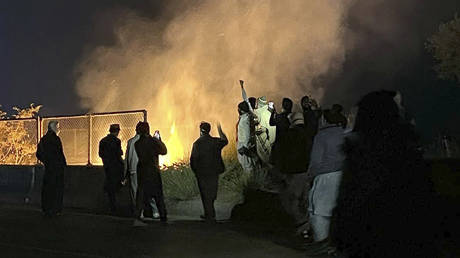DETROIT — There’s Riley Greene — right on time.
Leading off the bottom of the sixth inning of ALDS Game 4, Detroit’s All-Star outfielder stepped into the batter’s box in a tie game. In the previous frame, the Tigers had roared back to life against the Mariners to even the score 3-3 and restore confidence in the Detroit dugout that this team’s season would not end Wednesday. But there was more work to be done.
With one thunderous, left-handed swing, Greene reminded everyone what he’s capable of.
Facing a tough lefty in Mariners reliever Gabe Speier, Greene unleashed his particularly powerful cut on a slider in the heart of the zone and connected cleanly. The ball exploded off his bat at 111.9 mph and soared toward right-center field, an area of spacious Comerica Park where so many fly balls have fallen just short over the years. Not so this time. Greene cleared the fence with ease, with Statcast projecting the total distance at a whopping 454 feet — the farthest home run any batter has hit in Detroit’s ballpark in 2025 and the farthest home run Greene has hit at home in his major-league career.
“I haven’t hit a ball like that in a while,” he said afterward. “It feels pretty good — and I want to do it more often.”
Greene’s humongous homer was the signature moment in a season-saving effort by the Tigers in their 9-3 victory over the Mariners in Game 4 of the ALDS. With the win, they staved off elimination and forced Game 5 back in Seattle on Friday.
“I didn’t really care how far the ball went,” Greene added. “It was a homer, and we put another run on the board, so that’s all that mattered.”
Indeed, Greene’s homer gave the Tigers their first lead in the series since the 11th inning of Game 1.
“I was really just trying to get on base as a leadoff hitter, and I was just trying to get on base and get to Tork behind me, and I got a pitch I could handle,” he said.
Greene might speak humbly about his intentions, but the hellacious nature of his swing — and the numbers behind it — suggest otherwise. His profile as a middle-of-the-order masher is headlined by his ability to do serious damage when he makes contact. His willingness to swing hard and often has resulted in some prolific slugging numbers and also a boatload of strikeouts — 201, to be exact, the most in the American League in the regular season. It’s an aggressive approach that can be maddening to watch when the production is lacking, but it’s enthralling when he connects.
But early in his postseason career, Greene wasn’t connecting. He went 6-for-26 with just one double in his postseason debut last year. His at-bats this October hadn’t been much better, as he carried a low-slug 6-for-25 before his seismic swing Wednesday. As Greene’s aggressive hacks repeatedly produced poor results, his successful exploits from earlier in the summer felt like a distant, irrelevant memory as he floundered in the fall. The broadcast would flash his gaudy regular-season stats when he arrived at the plate — 36 home runs, 31 doubles, 111 runs batted in — only for him to go down flailing on three pitches or put a poorly struck ball in play.
Of course, 13 homerless postseason games plus a couple of meek groundouts to start Game 4 were not nearly a large enough sample to suggest that a monumental swing wasn’t possible for Greene. In fact, as it turned out, it was only a matter of time.
“He’s incredible,” manager A.J. Hinch said afterward. “And I know it’s been some tough times … but he never concedes, you know? And he is a tough kid. He’s had to endure a lot. I play him every day. He’s in the middle of the order. He gets managed against, and he comes up big right when you need it. That was a big swing.”
[Get more Detroit news: Tigers team feed]
With Greene’s blast, finally, the Comerica Park crowd could emote with confidence and elation. Yet just two innings earlier, Greene had sparked a completely different reaction from the exact same group of people. With the Tigers down 2-0 in the game with their season on the line, a leadoff hit from Gleyber Torres to start the fourth inning was immediately negated when Colt Keith grounded into a double play and Greene rolled over weakly to first base to end the inning, continuing a trend of poor offensive output in the series. The crowd could no longer contain its disappointment with Detroit’s lackluster performance, unleashing a chorus of boos to communicate the collective disgust.
It was a pained expression of dismay rooted in more than just Greene’s groundout or how Game 4 seemed to be unfolding. This was about what had transpired slowly and painfully over the past several weeks. It wasn’t just that Detroit had thus far looked noncompetitive in this particular postseason contest: The Tigers hadn’t won a game at Comerica Park since Sept. 6 against the White Sox. That’s 32 days, eight straight defeats at home — seven to finish the regular season, plus a lousy showing in Game 3 on Tuesday — and an unprecedented collapse to cede the division, circumstances that combined to produce the frustration that boiled over as the fourth inning concluded Wednesday.
But about 50 minutes later — once Greene’s titanic batted ball landed in the seats — all the agita evaporated. And from there, the Tigers rolled. Three more runs followed in the sixth against Seattle right-hander Eduard Bazardo, highlighted by another stadium-shaking home run courtesy of No. 9 hitter Javier Baez. That was a refreshing redo for Baez, who had narrowly missed a go-ahead homer the previous inning, sending it foul before he settled for a game-tying single.
“It’s not easy, honestly,” Baez said afterward, smirking when asked how a hitter can refocus after just missing a homer on the wrong side of the foul pole. “[After] you hit a home run foul, 90 percent of the time, you strike out. But I kept my plan and kind of stayed through the middle, and that’s exactly what happened and what I was trying to do. I got another homer.”
Indeed he did, the electric veteran infielder’s first postseason home run since 2017. On a roster with plenty of talent but relatively little big-game experience, Baez’s comfort and confidence this time of year stand out.
“Javi loves these big games, these big crowds, these opportunities to do something great. And he is a steady force in the middle of our field,” Hinch said postgame. “Every time I go out on the mound to change a pitcher, which seems to be a lot, Javi’s always there with some sort of calmness, even more so in the postseason than in the regular season. …
“He’s been there. He’s done it. It matters a lot to him, and the big swings — whether it’s a base hit to right, whether it’s the pull-side homer and everything in between — is pretty magical to see.”
Plus, having ridden a roller coaster of spectacular highs and treacherous lows throughout his career, some audible discontent from the home fans before a tide-turning rally is nothing new to him.
“The boos, I don’t mind that,” Baez said. “I mean, I have [gotten] boos all my career. I feel like that’s the desire of the fans to see us have success, you know? And you’ve got to let the fans be fans.
“We won the game. That’s what really matters.”
Before it was over, Gleyber Torres added a solo home run in the seventh, and Baez drove in his fourth run of the day with a groundout in the eighth. It was not only an uncharacteristic explosion of scoring relative to the Tigers’ recent offensive struggles but also a historic one by franchise standards: The nine runs Wednesday were the most produced by the Tigers in a playoff game since they scored 13 in Game 6 of the 1968 World Series — 84 postseason games ago!
Nearly as important to the offensive outburst was Detroit’s steadiness on the mound. Besides a shaky appearance from Tyler Holton in the fourth, the rest of the staff — most notably, Kyle Finnegan cleaning up Holton’s mess and rookie Troy Melton delivering three scoreless innings in relief — did well to quiet a Seattle lineup that had seemed to awaken in Game 3. The reward for their work is the privilege of turning the ball over to the ultimate ace of their unit, Tarik Skubal, in a winner-take-all Game 5 on Friday in Seattle.
“Sitting in my chair, one of the easiest things to do and one of the most exciting things to do is hand the ball to the best pitcher in baseball,” Hinch said.
“He’s so prepared for this moment. He obviously is somebody deeply trusted in our clubhouse to bring intensity, to bring high-end pitching and bring results. And we win together, we lose together, but he leads us, you know? He’s a big presence going into Game 5. As we get on this plane to go across the country, we’ve got a lot of optimism heading that way because of the presence of Tarik Skubal.”
It’s a daunting proposition on paper for the Mariners, who have yet to announce who will start Game 5 for them. Then again, if any team would be unfazed entering a high-stakes showdown with Skubal, it would be the one that defeated him twice in the regular season and did just enough to beat Detroit in Skubal’s Game 2 outing earlier this week.
“I think we’ve been able to get to Skubal throughout, and we have another chance to do that on Friday,” Mariners manager Dan Wilson said.
“These guys have done this all season long, where they get in tough situations, and they know exactly what to do, and they do fight back, and they do bounce back. And I’m not worried about that at all.
“And no better place to do that than at home.”





